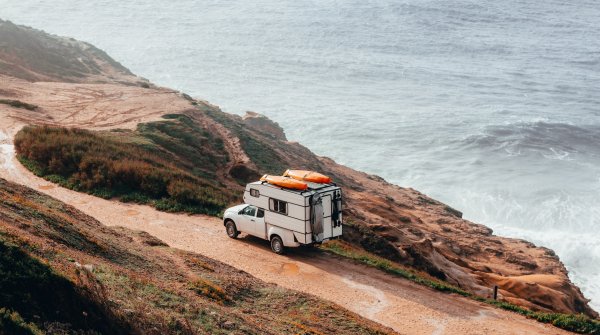Why hiking is so popular? Because the sport is accessible to people with a wide variety of backgrounds, prior experience and abilities.
In sports, we test our mental and physical limits, grow beyond ourselves, and develop. Not just as athletes, but as people who inspire others to make a difference.
And with ISPO.com, we want to give everyone this opportunity. In this post, Jasmin and Chris from the Instagram channel Glücksreisen² look back on their own development while hiking and show you what experiences and skills they were able to learn for life.
- Strengthen resilience
- Increase ambiguity tolerance & frustration tolerance
- Overcoming one's own weakness
- Confidence in own abilities
- Preparation is everything
- Different ways lead to the goal
- Listen to your body
- Give your body a break ("deceleration")
- Just think about "nothing" and let nature take effect
- Self-reward
- Appreciation
There will always come a point during a mountain hike when you say, "I can't or I don't want to anymore". Let me tell you this: All beginnings are difficult. Especially endurance and stamina increase with every meter climbed, until you can already see the top of the mountain and your legs (almost) automatically carry you up to your goal.
Because the reward is usually waiting at the top: a fantastic view of a unique mountain panorama that makes you completely forget the effort and the aching legs at that moment. Each hike makes you more sure-footed and the initial sore muscles from the beginning fade away. Your muscles already know the muscle regions that are needed for a hike, such as buttocks, calves or thighs.
With each hike, you'll get a little bit fitter, which will allow you to extend the length of the trail or increase the elevation gain.
Being able to tolerate ambiguity - what does that mean? Ultimately, it means accepting ambiguity, and that, too, can be trained.
But how can this be applied to hiking? It's simple: who hasn't experienced walking up the mountain full of anticipation, but suddenly your muscles start to burn and you secretly think to yourself, "Why am I doing this to myself again?"
The love of nature or the mountains always drive us, but at the same time we "hate" ourselves for dragging our tired limbs up the mountain. Most of all, we would like to sit on the couch at this very moment.
In addition, when hiking, you always come up against your own limits, which bring with them an inner frustration and impatience. However, you are often on your own when hiking and you have to try to solve this problem for yourself. For example, you don't really want to walk down anymore because your legs hurt. However, it does not help to complain, because you need to get back to the starting point.
Even if you would like to experience the most beautiful and highest mountain hikes right away, each of us starts small. Even with the best hiking boots, you won't be able to climb the Zugspitze or Mount Everest right away, but will have to learn to plan smaller rounds for the beginning.
That means: You learn very quickly when you reach your personal, physical and sometimes also psychological limits. Here it means to try yourself out bit by bit and then also to accept if you do not yet manage 1000 meters of altitude to a selected mountain hut, but only 500 meters of altitude to a beautiful crystal clear mountain lake.
It is a constant balance to know and accept one's own limits, but also to exceed them a little bit every now and then. Often "the inner pig dog" holds us back, although we could do much more. It can help if you are accompanied by a second person who knows you very well. They can motivate you to exceed your own predetermined limits.
However, this also means listening to the body at the same time when a physical limit is crossed and not crossing it by any means, as this also increases the risk of injury.
Regular exercise in the fresh air and beautiful nature helps more and more to trust in your own abilities again and to build self-esteem. You suddenly realize what your body is capable of and how you can achieve your goals step by step.
It has already been scientifically proven that hiking reduces stress hormones and improves physical and mental well-being. Even if you have the feeling that the mountain peak is still far away and you almost despair inwardly of really making it after all, a feeling of pride, joy and bliss then flows through your body at the summit.
How often do we doubt our own abilities because of quick criticism from colleagues or superiors. But if you trust in your abilities and continue on your way step by step, you can reach your goal if you only believe in yourself.
A very important point when hiking is the planning and organization of your mountain hike. At the latest for a hut hike or multi-day hike, you should check your equipment beforehand and think carefully about what you need for your hike. Sometimes you may not find water for hours on the way. If you don't have enough drinking water with you, it can quickly become dangerous.
The same goes for smaller snacks and enough to eat for more strenuous mountain tours, because a small muesli bar can already make you feel like you have a "second wind" once again.
Hiking suddenly becomes easier again, simply because your blood sugar was in the basement. In addition, it is always helpful to carry a GPS or tracking device with you, even if you "only" want to check the route.
A little planning and organization also gives us security in everyday life to have the scepter firmly in our hands and to be able to structure ourselves better.
It happens again and again when you're hiking - you ask yourself: Should I have followed the other hikers? Am I lost now? Which way leads further up the mountain?
It happens again and again when you're hiking - you ask yourself: Should I have followed the other hikers? Am I lost now? Which way leads further up the mountain?
But even here, sooner or later you will experience that different paths lead to the top of the mountain, and with them different levels of difficulty that you can adapt to your needs. Because one thing we all want to say, right? - We've been to the top of the mountain! How exactly we got there is often not asked at the end.
It is similar with us in everyday life, where we sometimes have to get creative to get to the goal and there is not only the one way to the solution.
Many hikers will have experienced it, the feeling of not being "fast enough". You're panting for air, your head is red as a beetle, you've already paused a dozen times, your muscles are aching, you feel like a snail moving along while "a light-footed gazelle" sprints past you up the mountain. And your self-confidence is gone!
But even here it means to pay attention to your body and your limits, because we all have a different pace, with which we feel comfortable and good for us. We would recommend that you hike only fast enough so that you can still talk and not be so out of breath, because then your pulse is often much too high.
It is also important that you manage your strength correctly. With a lack of strength, the lack of concentration increases, which can then lead more quickly to injuries or, in the worst case, to crashes.
Here we have already heard the craziest things, such as that "good and experienced hikers need little or no breaks". However, we can absolutely not recommend this, because breaks are useful and important, especially drinking breaks.
Whether it's just a short "standing break" for a sip from the water bottle or a longer rest on a lookout bench, it's important to give yourself a break at certain times so you can recharge your batteries.
Only in this way can we concentrate again on the next section of our hike and enjoy the view of the beautiful mountain panorama in a relaxed manner.
In everyday life, too, we are often so caught up in our daily grind and don't give our bodies or our minds a break, even though this would be so important in order to be able to work more productively again.
Nowadays we constantly have the cell phone in our hands, because we might have a new message on WhatsApp, miss the new trend on TikTok or spectacular videos on Instagram.
One thing you learn when hiking again: "back to the roots" - just walking, listening to your pulse beat and breathing, listening to the birds chirping and seeing and experiencing unique sunrises or sunsets with a beautiful color spectacle for yourself.
The best thing about it is to simply think about "nothing" and to switch off the carousel of thoughts and to mentally put the "to-do list" aside. What a liberating feeling! This is another skill that needs to be learned in everyday life and is often neglected. We must honestly admit - we are still working on this ability in everyday life, because we can often only achieve this with meditation.
Here in Bavarian Swabia there is a saying in the working world: "nothing said is praised enough", which from our point of view is absolute nonsense. Because nothing is more important than rewarding yourself for a job well done or a challenging mountain hike. Because many of us need a certain motivation to start a hike in the first place.
Then why not choose a nice route at the beginning to the hiking routine, where you can reward yourself, for example, with a delicious Kaiserschmarrn at the hut, a delicious mountain chocolate, a summit bike or a ride down into the valley with a summer toboggan run?
Far too rarely do we tell ourselves that we have done something well, because today's work and performance society expects us to "function". But even after a strenuous mountain hike or a hard day at work, it's perfectly okay to treat yourself to something.
We have to say quite honestly, even in our many travels and hikes that we have already done, we notice one thing again and again: The most beautiful things in the world are often free. Especially when hiking in nature, we feel an inner gratitude for this beauty in the world that is given to us.
There are so many little things when hiking that immediately trigger an absolute feeling of happiness, such as a turquoise mountain lake, a hidden thundering waterfall behind the trees, a flap of a butterfly's wings or the beautiful mountain panorama with snow-capped peaks that accompany you on your hike. We appreciate these "moments of happiness" very much on hikes and realize again and again that it is the little things that make you happy.
You don't need a lot of money to discover and experience these natural wonders. That is why it is so important for us to take care of them and leave them as we found them.
 OutDoor by ISPOOutDoor in transition
OutDoor by ISPOOutDoor in transition
- ISPO awards
- Mountain sports
- Bike
- Design
- Retail
- Fitness
- Health
- ISPO Job Market
- ISPO Munich
- ISPO Shanghai
- Running
- Brands
- Sustainability
- Olympia
- OutDoor
- Promotion
- Sports Business
- ISPO Textrends
- Triathlon
- Water sports
- Winter sports
- eSports
- SportsTech
- OutDoor by ISPO
- Heroes
- Transformation
- Sport Fashion
- Urban Culture
- Challenges of a CEO
- Trade fairs
- Sports
- Find the Balance
- Product reviews
- Newsletter Exclusive Area
- Magazine






